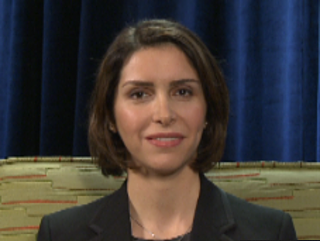KL2 Scholar Publishes Newly Described Disease Case in NEJM

Arezou Khosroshahi, MD, Assistant Professor, Department of Medicine, Division of Rheumatology, Emory University, a current ACTSI (Atlanta Clinical & Translational Science Institute) KL2-Mentored Clinical and Translational Research Scholar, is the first author on a recent publication in the New England Journal of Medicine – Case 34-2015: A 36-Year-Old Woman with a Lung Mass, Pleural Effusion, and Hip Pain. Khosroshahi is considered one of the few experts in the Unites States on IgG4-related disease, a newly described disease.
The case describes a 36-year old woman, who over nearly a year went from generally healthy to having an undiagnosed pulmonary condition requiring multiple biopsies and finally resection of parts of her lungs with no diagnosis.
She was admitted to the hospital with pain in her shoulders, cough, and difficulty breathing. She was found to have a mass in the middle lobe of her right lung, and an excess collection of fluid between the layers of the lungs and chest wall (medically named a “pleural effusion”).
Her extensive evaluations for infectious and malignant causes did not reveal any diagnosis. After resection of two lobes of her lungs she was given the diagnosis of lipoid pneumonia, a rare condition that could develop due to obstruction of the airways. There was also fibrinous pleuritis, in which opposing surfaces of the pleura of the lungs adhere to one another. The patient’s chest pains and respiratory symptoms however still persisted and progressed despite surgery and multiple antibiotic treatment.
Later the patient developed pain in her right hip. An MRI revealed inflammatory changes along the right pelvic vessels and muscles indicating retroperitoneal inflammation. Khosroshahi was invited to discuss the approach and differential diagnosis of this case without knowing the at Massachusetts General Hospital.
Khosroshahi considered a multitude of possible issues, constructing a differential diagnosis that focused on diseases that cause pleuropulmonary disease and retroperitoneal inflammation, including possible infections like tuberculosis and actinomycosis, lung cancer, inflammatory myofibroblastic tumor, erdheim-chester disease, immune-mediated conditions, granulomatosis with polyangiitis, sarcoidosis, and IgG4-related disease.
IgG4-related disease is a fibroinflammatory condition that can evolve over time, which would explain why this patient first presented with lung disease many months before the retroperitoneal inflammation developed. This disease has a tendency to result in mass lesions, and is often mistaken for cancer, as was the case with this woman. Patients can present with abnormal imaging findings and either no symptoms or respiratory symptoms, including cough and chest pain.
Khosroshahi emphasizes that the diagnosis of this disease, which would explain both the pleuropulmonary disease and retroperitoneal inflammation, is done through the review of tissue samples and the correlating the clinical data and pathological findings. “The original lung specimens were reexamined and the tumor reevaluated. Immunohistochemical staining revealed an increase in IgG4-positive plasma cells in the affected tissue. Reexamination revealed the presence of all three histologic features of the disease, which supported the diagnosis of IgG4-related pulmonary disease,” said Khosroshahi. The woman was treated in light of this proper diagnosis, and she experienced tremendous improvement in her respiratory symptoms, resolving both chest discomfort and hip pain.
Khosroshahi’s efforts over the past five years led to important contributions to the field of IgG4-related disease including new approach for treatment of this condition and over 25 peer-reviewed publications. Since her arrival at Emory, she established a specialized clinic for patients with IgG4-related disease. She continues her work in IgG4-related disease as the focus of her KL2 mentored research project. Her research is focused on identifying a new biomarker for this condition to be able to make the diagnosis easier and spare patients from multiple invasive procedures for the diagnosis.
The goal of the ACTSI KL2-Mentored Clinical and Translational Research Scholars (MCTRS) program is to support career development for junior faculty (MD, PhD, or MD/PhD) from a wide variety of disciplines at Emory University, Morehouse School of Medicine, and Georgia Institute of Technology (Georgia Tech) to become independent, established, and ethical clinical and/or translational research investigators. KL2 scholars receive salary support, a budget for their research, and tuition for the Master of Science in Clinical Research (MSCR) degree.
ACTSI is a city-wide partnership between Emory, Morehouse School of Medicine, and Georgia Tech and is one of over 60 in a national consortium striving to improve the way biomedical research is conducted across the country. The consortium, funded through the National Center for Advancing Translational Sciences (NCATS) and the National Institutes of Health’s Clinical and Translational Science Awards, shares a common vision to translate laboratory discoveries into treatments for patients, engage communities in clinical research efforts, and train the next generation of clinical investigators.